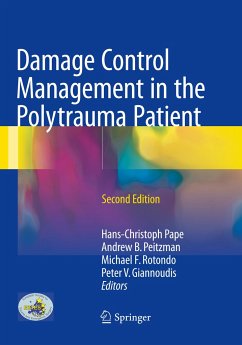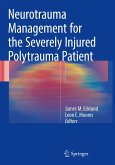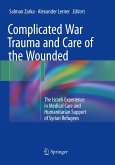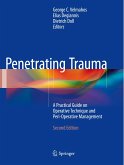Damage Control Management in the Polytrauma Patient
Herausgegeben:Pape, Hans-Christoph; Peitzman, Andrew B.; Rotondo, Michael F.; Giannoudis, Peter V.
90,99 €
inkl. MwSt.
**Unverbindliche Preisempfehlung des Herstellers
Versandkostenfrei*Versandfertig in 6-10 Tagen

45 °P sammeln
Damage Control Management in the Polytrauma Patient
Herausgegeben:Pape, Hans-Christoph; Peitzman, Andrew B.; Rotondo, Michael F.; Giannoudis, Peter V.
- Broschiertes Buch
- Merkliste
- Auf die Merkliste
- Bewerten Bewerten
- Teilen
- Produkt teilen
- Produkterinnerung
- Produkterinnerung
This book is an unparalleled source of cutting-edge information on every aspect of rescue, trauma management, and fracture care in the polytrauma/multiple injured patient. Damage control surgery is approached logically and systematically by dividing treatment into phases. The common goal of treating life-threatening conditions first, then treating major pelvic and extremity fractures, requires cooperation among all major disciplines and subspecialties involved in the care of polytrauma patients, and the book is accordingly multidisciplinary in nature. It is edited by pioneers in the field and…mehr
Andere Kunden interessierten sich auch für
![Neurotrauma Management for the Severely Injured Polytrauma Patient Neurotrauma Management for the Severely Injured Polytrauma Patient]() Neurotrauma Management for the Severely Injured Polytrauma Patient91,99 €
Neurotrauma Management for the Severely Injured Polytrauma Patient91,99 €![Complicated War Trauma and Care of the Wounded Complicated War Trauma and Care of the Wounded]() Complicated War Trauma and Care of the Wounded49,99 €
Complicated War Trauma and Care of the Wounded49,99 €![Emergency Laparoscopy Emergency Laparoscopy]() Emergency Laparoscopy82,99 €
Emergency Laparoscopy82,99 €![The Poly-Traumatized Patient with Fractures The Poly-Traumatized Patient with Fractures]() The Poly-Traumatized Patient with Fractures75,99 €
The Poly-Traumatized Patient with Fractures75,99 €![Penetrating Trauma Penetrating Trauma]() Penetrating Trauma150,99 €
Penetrating Trauma150,99 €![Major Fractures of the Pilon, the Talus, and the Calcaneus Major Fractures of the Pilon, the Talus, and the Calcaneus]() Major Fractures of the Pilon, the Talus, and the Calcaneus112,99 €
Major Fractures of the Pilon, the Talus, and the Calcaneus112,99 €![Entwicklungen in der Unfallchirurgie Entwicklungen in der Unfallchirurgie]() Entwicklungen in der Unfallchirurgie54,99 €
Entwicklungen in der Unfallchirurgie54,99 €-
-
-
This book is an unparalleled source of cutting-edge information on every aspect of rescue, trauma management, and fracture care in the polytrauma/multiple injured patient. Damage control surgery is approached logically and systematically by dividing treatment into phases. The common goal of treating life-threatening conditions first, then treating major pelvic and extremity fractures, requires cooperation among all major disciplines and subspecialties involved in the care of polytrauma patients, and the book is accordingly multidisciplinary in nature. It is edited by pioneers in the field and the authors are all acclaimed experts. This second, revised and updated edition of Damage Control Management in the Polytrauma Patient will be invaluable for all clinicians who must weigh life-saving operations against limb-threatening conditions, including emergency personnel, trauma surgeons, orthopaedic traumatologists, and anesthesiologists.
Produktdetails
- Produktdetails
- Verlag: Springer / Springer International Publishing / Springer, Berlin
- Artikelnr. des Verlages: 978-3-319-84904-1
- 2. Aufl.
- Seitenzahl: 352
- Erscheinungstermin: 28. Juli 2018
- Englisch
- Abmessung: 254mm x 178mm x 18mm
- Gewicht: 742g
- ISBN-13: 9783319849041
- ISBN-10: 3319849042
- Artikelnr.: 53584071
- Herstellerkennzeichnung
- Springer-Verlag GmbH
- Tiergartenstr. 17
- 69121 Heidelberg
- ProductSafety@springernature.com
- Verlag: Springer / Springer International Publishing / Springer, Berlin
- Artikelnr. des Verlages: 978-3-319-84904-1
- 2. Aufl.
- Seitenzahl: 352
- Erscheinungstermin: 28. Juli 2018
- Englisch
- Abmessung: 254mm x 178mm x 18mm
- Gewicht: 742g
- ISBN-13: 9783319849041
- ISBN-10: 3319849042
- Artikelnr.: 53584071
- Herstellerkennzeichnung
- Springer-Verlag GmbH
- Tiergartenstr. 17
- 69121 Heidelberg
- ProductSafety@springernature.com
Hans-Christoph Pape, MD, FACS, graduated in 1988 from Hannover Medical School, where he then completed a residency in trauma surgery. He was appointed Full Professor of Trauma Surgery at the School in 2000. Between 2003 and 2005 Dr. Pape was also a Visiting Professor at Harvard Medical School and other U.S. universities. Dr. Pape is currently W. Pauwels Professor and Chairman of the Department of Orthopaedic/Trauma Surgery at the University of Aachen Medical Center, Germany. During his career, Dr. Pape has received many awards, including the Novartis Prize (2005), the Swiss AO Foundation Annual Award (2006), and the Kappa Delta Award from the American Academy of Orthopedic Surgeons (2008). He is the Editor in Chief for Open Access Emergency Medicine and a Section Editor for Injury and the European Journal of Trauma. Dr. Pape has been the lead author on 81 publications in peer-reviewed journals and co-author of a further 220. He is also the editor or author of several important booksand has led many courses on polytrauma management. Michael F. Rotondo, MD, FACS, is Professor in the Division of Trauma and Acute Care Surgery in the Department of Surgery, The School of Medicine and Dentistry at the University of Rochester in Rochester, New York. He is also Senior Associate Dean for Clinical Affairs and CEO of the University of Rochester Medical Faculty Group. Prior to this he served as Professor and Chairman of the Department of Surgery, The Brody School of Medicine at East Carolina University and Director of the Centre of Excellence for Trauma and Surgical Critical Care at Vidant Medical Centre in Greenville, North Carolina for 14 years. Dr. Rotondo graduated from Georgetown University School of Medicine in 1984 and then undertook postgraduate training at the Thomas Jefferson University Hospital, Philadelphia, and the Hospital of the University of Pennsylvania (Fellowship in Traumatology and Surgical Critical Care). He gained his board certification from the American Board of Surgery in 1990 and also holds a Special Certificate in Surgical Critical Care and is counted among the The Best Doctors in America. Dr. Rotondo has held a number of visiting professorships across the United States and currently serves as Chair of the Committee on Trauma for the American College of Surgeons. He is a member of the Editorial Review Board for Journal of Trauma and an ad hoc reviewer for many leading journals. Dr. Rotondo is the author of more than 100 articles in peer-reviewed journals and has over 250 publications in total. Peter Giannoudis, BSc, MB, MD, FRCS, is Professor in the Academic Department of Trauma & Orthopaedic Surgery, School of Medicine, University of Leeds, UK and Honorary Consultant at Leeds General Infirmary. He specializes in the management of multiple injured patients and has major interest in reconstructive surgery and the molecular aspects of trauma. Dr. Giannoudis is a past President of the British Trauma Society and of the European Society of Pelvis and Acetabulum. He is also an Executive Board Member of the British Orthopaedic Association National Trauma committee, an instructor for the American Academy of Orthopaedic Surgeons and the British Orthopaedic Association, an executive member of the EFORT Trauma Task Force, and past Chairman of the AO polytrauma course. Dr. Giannoudis is the author of more than 450 articles in peer-reviewed journals as well as seven textbooks. He is Editor in Chief of Injury, Associate Editor of Bone & Joint Surgery (Am) and an editorial board member for various other journals. Andrew B. Peitzman, MD, holds the Mark M. Ravitch Endowed Chair in Surgery at the University of Pittsburgh, where he is also Professor of Physical Medicine and Rehabilitation. Since 1997 Dr. Peitzman has been Chief of the Division of General Surgery in the Department of Surgery at University of Pittsburgh School of Medicine. He is the recipient of many awards and honors, including appointment as Distinguished Professor, University of Pittsburgh School of Medicine (2012) and regular inclusion in The Best Doctors in America. Dr. Peitzman is an editorial board member of the Journal of Trauma, World Journal of Emergency Surgery, Revista de Medicina y Cirugia del Trauma (Argentina), and Emergency Medicine and Catastrophes (Spain). He is an Advisory Board and Section Editor for the European Journal of Trauma and Emergency Surgery. Dr. Peitzman's particular areas of clinical interest include complicated abdominal surgery and critical care medicine, and he has participated in many successful clinical research endeavors. He is the author of more than 180 refereed articles.
Section A: Introduction - Pathophysiology.- 1. Evolution of trauma systems.- 2. Concept of DC.- 3. Epidemiology of polytrauma and life threatening injuries.- 4. Response to major injury (hem. shock vs traumatic shock / soft tissue injury.- 5. Defining the lethal triade Coagulopathy, hypothermia and acidosis.- Section B: General treatment principles.- 6. Blood and fluid resuscitation.- 7. Impact of head injury in the polytrauma patient.- 8. Chest trauma: Classification and influence on the general management
9. Abdominal compartment syndrome.- 10. Orthopaedic surgery approach to DC; decision making and indications.- 11. General surgery surgery approach to DC: decision making and indications.- 12. New technologies for vascular injuries and hemorrhage control.- Section C: Phases of damage control.- 13. Phase 0: Prehospital management.- 14. Phase I: abbreviated surgery- general surgery.- 15. Phase I: abbreviated surgery- orthopaedic surgery.- 16. Phase II: ICU management.- 17. Phase III: second operation - repair of all injuries; general surgery.- 18. Phase III: second operation - repair of all injuries; orthopaedic surgery.- 19. Phase IV: late reconstruction - abdominal / chest wall closure .- 20. Phase IV: late reconstruction - plastic surgery for orthopaedics.- Section C: Special circumstances and outcomes.- 21. Principles of damage control for pelvic ring injuries.- 22. Principles of damage control for pediatric trauma.- 23. Principles of damage control in the elderly.- 24. Vascular injuries in polytrauma patients.- 25. Principles for damage control in military casualties.- 26. Penetrating injuries and Damage Control Surgery; considerations and treatment options.- 27. Complications after orthopaedic DC: pin tract infections.- 28. Complications post damage control for the General Surgeon.- 29. Outcomes of damage control surgery - general.- 30. Outcomes of damage controlsurgery - orthopaedic.
9. Abdominal compartment syndrome.- 10. Orthopaedic surgery approach to DC; decision making and indications.- 11. General surgery surgery approach to DC: decision making and indications.- 12. New technologies for vascular injuries and hemorrhage control.- Section C: Phases of damage control.- 13. Phase 0: Prehospital management.- 14. Phase I: abbreviated surgery- general surgery.- 15. Phase I: abbreviated surgery- orthopaedic surgery.- 16. Phase II: ICU management.- 17. Phase III: second operation - repair of all injuries; general surgery.- 18. Phase III: second operation - repair of all injuries; orthopaedic surgery.- 19. Phase IV: late reconstruction - abdominal / chest wall closure .- 20. Phase IV: late reconstruction - plastic surgery for orthopaedics.- Section C: Special circumstances and outcomes.- 21. Principles of damage control for pelvic ring injuries.- 22. Principles of damage control for pediatric trauma.- 23. Principles of damage control in the elderly.- 24. Vascular injuries in polytrauma patients.- 25. Principles for damage control in military casualties.- 26. Penetrating injuries and Damage Control Surgery; considerations and treatment options.- 27. Complications after orthopaedic DC: pin tract infections.- 28. Complications post damage control for the General Surgeon.- 29. Outcomes of damage control surgery - general.- 30. Outcomes of damage controlsurgery - orthopaedic.
Section A: Introduction - Pathophysiology.- 1. Evolution of trauma systems.- 2. Concept of DC.- 3. Epidemiology of polytrauma and life threatening injuries.- 4. Response to major injury (hem. shock vs traumatic shock / soft tissue injury.- 5. Defining the lethal triade Coagulopathy, hypothermia and acidosis.- Section B: General treatment principles.- 6. Blood and fluid resuscitation.- 7. Impact of head injury in the polytrauma patient.- 8. Chest trauma: Classification and influence on the general management
9. Abdominal compartment syndrome.- 10. Orthopaedic surgery approach to DC; decision making and indications.- 11. General surgery surgery approach to DC: decision making and indications.- 12. New technologies for vascular injuries and hemorrhage control.- Section C: Phases of damage control.- 13. Phase 0: Prehospital management.- 14. Phase I: abbreviated surgery- general surgery.- 15. Phase I: abbreviated surgery- orthopaedic surgery.- 16. Phase II: ICU management.- 17. Phase III: second operation - repair of all injuries; general surgery.- 18. Phase III: second operation - repair of all injuries; orthopaedic surgery.- 19. Phase IV: late reconstruction - abdominal / chest wall closure .- 20. Phase IV: late reconstruction - plastic surgery for orthopaedics.- Section C: Special circumstances and outcomes.- 21. Principles of damage control for pelvic ring injuries.- 22. Principles of damage control for pediatric trauma.- 23. Principles of damage control in the elderly.- 24. Vascular injuries in polytrauma patients.- 25. Principles for damage control in military casualties.- 26. Penetrating injuries and Damage Control Surgery; considerations and treatment options.- 27. Complications after orthopaedic DC: pin tract infections.- 28. Complications post damage control for the General Surgeon.- 29. Outcomes of damage control surgery - general.- 30. Outcomes of damage controlsurgery - orthopaedic.
9. Abdominal compartment syndrome.- 10. Orthopaedic surgery approach to DC; decision making and indications.- 11. General surgery surgery approach to DC: decision making and indications.- 12. New technologies for vascular injuries and hemorrhage control.- Section C: Phases of damage control.- 13. Phase 0: Prehospital management.- 14. Phase I: abbreviated surgery- general surgery.- 15. Phase I: abbreviated surgery- orthopaedic surgery.- 16. Phase II: ICU management.- 17. Phase III: second operation - repair of all injuries; general surgery.- 18. Phase III: second operation - repair of all injuries; orthopaedic surgery.- 19. Phase IV: late reconstruction - abdominal / chest wall closure .- 20. Phase IV: late reconstruction - plastic surgery for orthopaedics.- Section C: Special circumstances and outcomes.- 21. Principles of damage control for pelvic ring injuries.- 22. Principles of damage control for pediatric trauma.- 23. Principles of damage control in the elderly.- 24. Vascular injuries in polytrauma patients.- 25. Principles for damage control in military casualties.- 26. Penetrating injuries and Damage Control Surgery; considerations and treatment options.- 27. Complications after orthopaedic DC: pin tract infections.- 28. Complications post damage control for the General Surgeon.- 29. Outcomes of damage control surgery - general.- 30. Outcomes of damage controlsurgery - orthopaedic.







